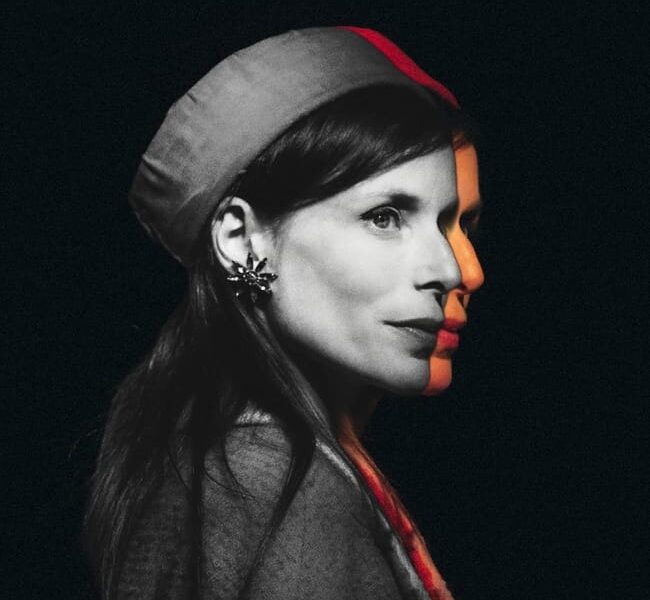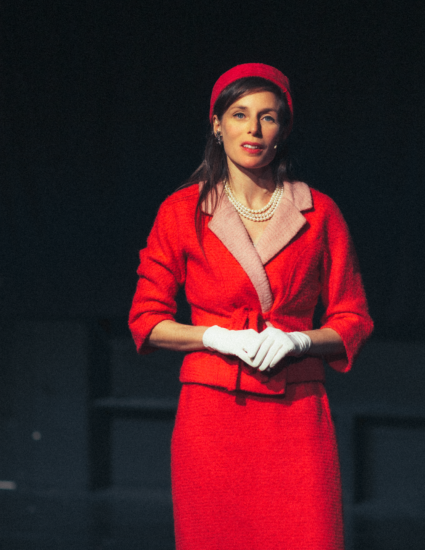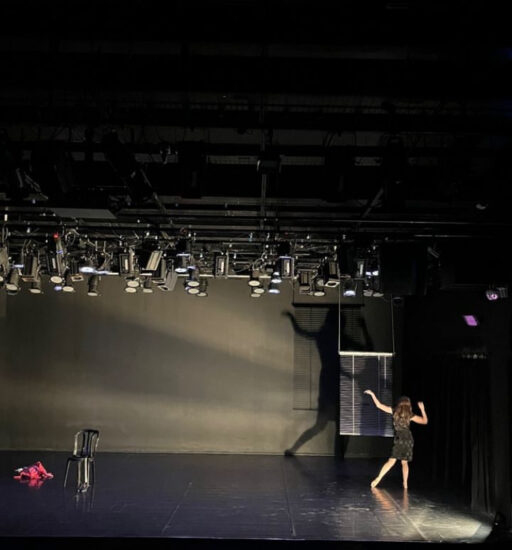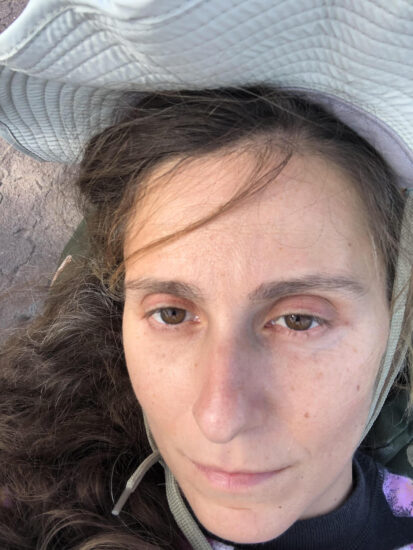Impressions of Jackie Pink and Black by Ori Lenkinski, written by Jenny Birger

*
It was an early Saturday evening with splendid weather for the end of November. Yaron Yerushalmi Hall felt cosy and filled with good energy, and I realized once more that I preferred seeing shows there rather than in Dellal, it’s bigger and more intimidating sister-hall. It’s almost like Yerushalmi sings to you “Come As You Are”, while Dellal doesn’t sing, rather it’s me humming “I Will Survive” every time I enter.

Photo Eyal Radoshitzky
The black stage was bare, with one black Keter chair and a hanging folded blind. Ori, or should I say, Jackie, greeted us in her iconic pink suit, pink hat, white gloves and black shoes. With her soothing voice, almost whispering, she took us on a tour of the performance venue without leaving our seats. We learnt amusing facts and stories about Suzanne Dellal’s rich history. I found it deeply grounding, turning my attention to the here-and-now: the velvet-like material under my sitting bones, the sounds of people’s laughter, their perfumes. It’s a bit embarrassing to admit, but much of my perception of dance shows is defined by the perfumes of my neighbours. A pleasant smell, and I fall in love; a pungent one, and I just want to flee. Luckily, my neighbors chose well that day.
That moment, the present moment in that time, of me sitting in Yaron Yerushalmi Hall and listening to Jackie, became intimately connected to myriad moments in the past, where people dreamed about this very hall and the hope it would bring to future generations by creating a space for dance in Tel Aviv. The ghost of Jackie evoked other ghosts, people that “were but are no more”, and it got me thinking of all these last 13 months of war and all those who are present in their absence. Ghosts are mighty creatures.
Having situated us firmly in our seats, we were led further into the past, this time diving into Jacqueline Kennedy’s public and private life. Decomposing her everyday movements and gestures as The First Lady, as they were captured on camera, Ori skillfully turned them into choreographic sequences. We discover that being a public figure demands learning very specific ways to do most everyday tasks. Basically, it means to perform a non-stop, durational piece called “life”. There are codes for everything: how to walk, talk, smile, how to pose for a photograph next to your husband, how to wave to the public in a warm and inviting manner (having tried it at home, I attest – it’s harder than you think).
And even though I’m certainly not a public figure, this felt familiar. Because in a much subtler way, we are all taught ways to perform ourselves – especially women. “One is not born, but rather becomes a woman”, said Simone de Beauvoir. The bigger the gap between the public version and the private version of ourselves, the more we have to constantly juggle between our different suits, and it can get exhausting.
*
“You’re going to hate me, but this text is completely flat”, my partner told me after having read the first draft. After my initial resistance, which took almost a day to process, I re-read it a few times, feeling deeply that she’s right. I could see where I left out thoughts and ideas that moved me during the show, but did not belong to the composed image of Jenny as I saw myself. Having grown up in the Soviet Union, the rule book was short and simple: you should always appear perfect. No room for emotions, sharing private and intimate details, certainly not anything that can make you look weak.
*
The pink Jackie is defined, or perhaps even devoured, by her role as “the wife of”. With the tragic death of her husband, she becomes “the widow of”, and this one-worded difference opens a world of expression.

Photo Renana Benit
The black Jackie allows herself to be more of-herself. Her diction is less perfect, her hair gets disheveled, and the frozen smile melts and gives way to a wide palette of emotions. Sometimes I even feel that through Jackie I get to see Ori, and when she talks, I am not always sure whose voice it represents. Some stories confuse me, like the story about taking two kids to the beach. I try to remember – does Ori have two kids or three? Could it be her story, or a mix of the two women, the performer and the ghost, each empowering the other to be more of-herself?
*
Question: can you be touched by a ghost of someone that you never met and knew very little about?
Answer: Oh yes, you can.
Interweaving facts, anecdotes, imagery, recordings, and her own interpretation of this complex web of data, Ori’s ghost of Jacqueline Kennedy touched me deeply. It made me think of a beautiful poem I discovered earlier this year called “Bluebird”, by another American icon – Charles Bukowski. It starts like this: “There’s a bluebird in my heart that wants to get out but I’m too tough for him. I say, stay in there, I’m not going to let anybody see you.” Jackie Pink and Black feels like opening the cage, enabling us to hear the bluebird sing a little.
*
Coming out of Yaron Yerushalmi Hall, there is a big gathering of people, most of whom I don’t know. They all look uplifted, laughing, enjoying the free wine served after the show. Some of them, like me, are waiting for Ori to come out, to tell her how much we enjoyed the show. I meet a friend from the dance world, who I thought had been accepted to a festival that I didn’t get into. I share with her my frustration at once again receiving a generic “Thank you for your application. Unfortunately, this year, we received a large number…”, and it turns out she wasn’t accepted either. I feel relief. What do we do, I ask her? We have to continue submitting, and doing, and believing. It’s so hard, I tell her. But that’s how it goes, there is no other way. You submit a hundred times, and one of them will be a Yes. Ask Ori, she tells me, she will surely know about it. But Ori is successful, I tell her, she’s doing well (touch wood, Hamsa), she has shows in Suzanne Dellal. Yes, but you don’t know what’s not in the spotlight. I remembered a beautiful sentence that Jackie said during the show about spotlight, what was it again? I have to ask Ori.
“The thing they don’t tell you about the spotlight is that from the outside it looks like a beautiful beam hiding all the ugliness around but from the inside you can’t see anything at all.”
Ori Lenkinski presented Jackie Pink and Black on November 30 at the Suzanne Dellal Centre.
ג׳ני בירגר
ילידת 1984 (קייב, אוקראינה), חיה ויוצרת בתל אביב.
יוצרת רב תחומית, רקדנית ומורה.
בעלת דוקטורט בבלשנות, שלימד אותי ללמוד, לחקור, להעמיק, וגם התווה את העניין בתנועה כשפה עשירה מאין
כמוה.
מלמדת יוגה ופילאטיס, מחול ב״קהילה בתנועה״; (שיעורי מחול עבור א.נשים שחיים עם מחלת הפרקינסון, להקת
המחול יסמין גודר), מפתחת סדנאות של אלתור בתנועה וגם במילים. בשנים האחרונות חוקרת את המחול
המערב-אפריקאי, ועבודה עם קצב ואנרגיה גבוהה. יוצרת של וידיאו-דאנס שהוקרנו ברחבי העולם, דרכן הבנתי
שאין כמו נוכחות חיה. כיום עובדת על כמה יצירות מחול ופרפורמנס, בשאיפה לרוקן מעט את המגירות העמוסות.
